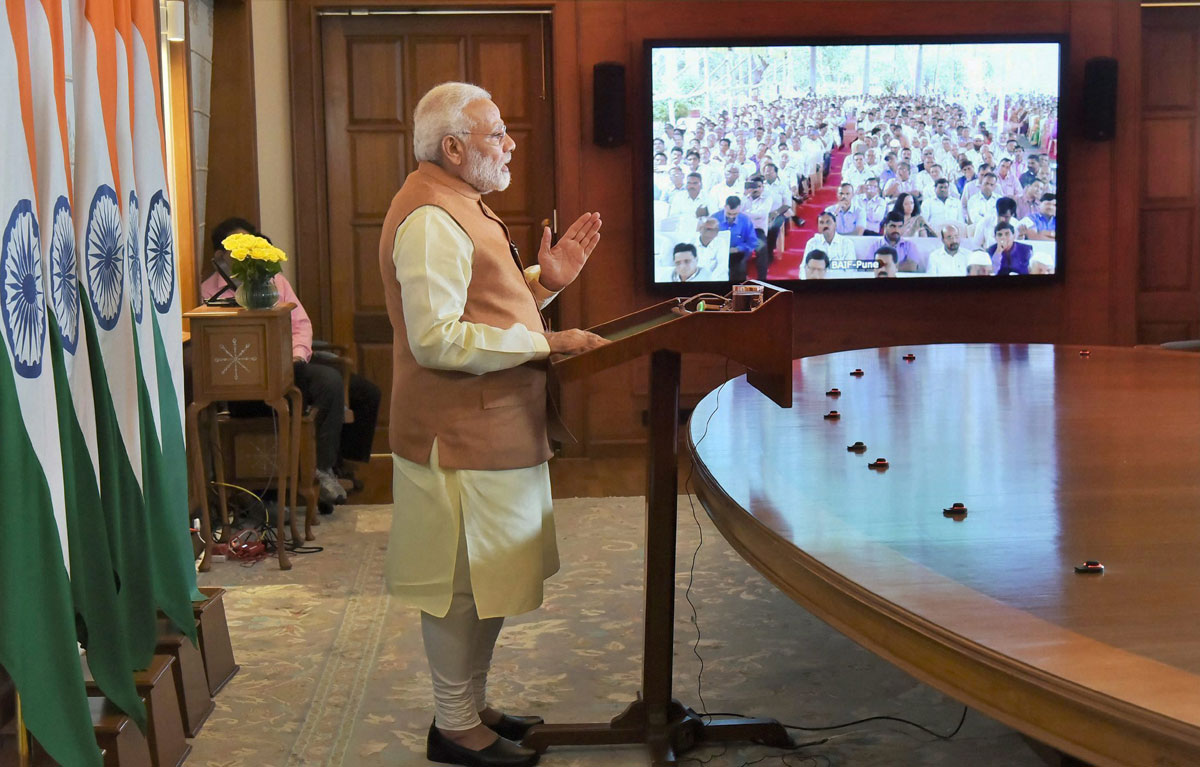Modi Pitches for Creating ‘Digital Villages’ for ‘New India’
Prime Minister Narendra Modi addressing the Golden Jubilee Celebrations of Bharatiya Agro Industries Foundation (BAIF) at Pune via video conferencing, in New Delhi, Aug. 24. (Press Trust of India)
Prime Minister Narendra Modi pitched for creating ‘digital villages’ as part of developing the rural sector and ensuring empowerment of farmers, Aug. 24, saying it was essential to realize the dream of ‘New India.’
He said if at least 500 villages could be made ‘less cash’ per year as part of realizing the dream of ‘digital villages,’ it will create a “chain reaction” spreading to thousands of villages.
The prime minister also emphasized the need for focusing on growth of livestock sector and said skill training should be provided to womenfolk, who play a crucial role in this area.
Underlining the importance of empowering the farmers in the villages, Modi said it was essential for the balanced development of the country.
“Today, there is a need to feel proud of our villages,” he said, suggesting that events should be held annually in villages in which those who have migrated to urban areas can participate and reconnect with their roots.
“For the development of the nation, prosperity of farmers is essential. ….The ‘annadaatas’ of the nation should be free from worries,” he said.
“Without an empowered farmer, the dream of ‘New India’ will remain unfulfilled,” he said addressing the Golden Jubilee and Foundation Day celebrations of Pune-based Bharatiya Agro Industries Foundation via video conferencing.
Talking about the concept of digital villages, he said the government is connecting all Panchayats through optical fiber.
“Putting infrastructure alone is not sufficient. There is a need to make the villagers capable to use the technology,” he said emphasizing the role of NGOs in empowering villagers.
“Through the use of technology, the dream of digital village can be realized, such a village where most of the transactions would be done digitally, all forms can be filled online, studies in schools can be conducted digitally and health services could also be linked to digital technology,” he said.
“Can we take a pledge that each year, at least 500 villages would be converted into ‘less cash’? If 500 villages are made ‘less cash’, thousands of adjoining villages will also adopt the systems. Through a chain reaction, this will spread from one village to another,” the prime minister said.
He called for revolution in the fishery, honeybee and water sectors to boost farm income while saying that the government’s policy is focusing on reducing input cost.
Noting that the government is working towards doubling farmers’ income by 2022, he said. “The focus of all agri-policies has been shifted from production-centric to income- centric.”
The government is with the farmers, right from sowing till marketing of agri-products, he added.
Highlighting steps taken in the agri-sector, Modi said the government is encouraging organic farming and crop diversification while it has distributed over 9 crore soil health cards and linked over 500 mandis with e-NAM (electronic National Agriculture Market).
The Center has recently announced Pradhan Mantri Kisan Sampada Yojana to address the storage problem and promote processing and value addition.
Among other initiatives, he said crop risk of farmers is being insured under the Pradhan Mantri Fasal Bima Yojana and cheaper crop loans are being provided to save them from private money lenders.
“The government’s effort is to reduce the input cost of farmers and increase their income. When farmers are free from worries, the country will make progress,” Modi said.
The cost of agri-production is coming down due to the government policies, he added.
Referring to the livestock sector, Modi said Rs 40,000 crore are lost due to animal diseases and suggested organizing more livestock health camps to address the problem.
He said 70 percent of those engaged in this field are women and they should be given training to look after the cattle in a better way.
In this context, he said women self-help groups (SHGs) should be given training in veterinary science and animal feed, who in turn could train the village women for further growth of the sector.
He also talked about huge potential not only in organic farming but also medicinal and aromatic plants amid rise in global demand.
Observing that agriculture is not about growing wheat and rice, the prime minister said, “People know about Green and White Revolutions. The need of the hour is Blue Revolution to transform the lives of fisheries and Sweet Revolution to boost additional income from beekeeping.”
He also called for Water revolution, emphasizing the need for using technology to ensure ‘per drop more crop.
Regarding the problems faced by the farmers in several parts of the country including Vidarbha in Maharashtra, Modi said the government is trying to address these through the Pradhan Mantri Krishi Sinchai Yojana.
“Out of 99 pending irrigation projects, we have completed 21,” he said, adding the government is spending 60 percent of MNREGA funds on water conservation.
“Encourage farmers towards sub-sectors of the agriculture to boost their income,” Modi said and suggested recycling of the agri-waste, compost manufacturing and generation of solar energy could be other options for farmers to earn additional income.
Solar panels can be put in farm fields and farmers can even set up a cooperative on the lines of milk cooperatives, he added.


